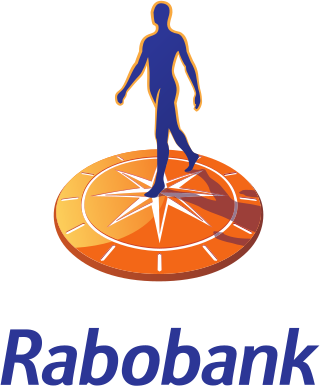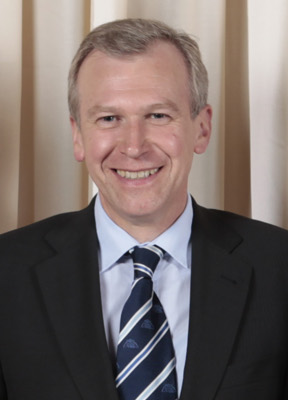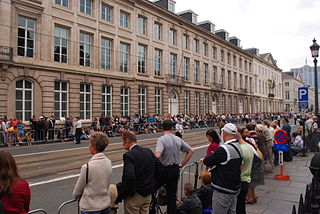
The ING Group is a Dutch multinational banking and financial services corporation headquartered in Amsterdam. Its primary businesses are retail banking, direct banking, commercial banking, investment banking, wholesale banking, private banking, asset management, and insurance services. With total assets of US$967.8 billion, it is one of the biggest banks in the world, and consistently ranks among the top 30 largest banks globally.

Jean Luc Joseph Marie "Jean-Luc" Dehaene was a Belgian politician who served as the prime minister of Belgium from 1992 until 1999. During his political career, he was nicknamed "The Plumber" and "The Minesweeper" for his ability to negotiate political deadlocks. A member of the Christen-Democratisch en Vlaams (CD&V) party and its antecedents, Dehaene gained his first ministerial appointment in 1981. Dehaene's first government (1992–1995) included both Christian and Social Democrats and presided over the creation of a new constitution, effectively transforming Belgium into a federal state. His second government (1995–1999) coincided with a number of crises in Belgium including the Dutroux scandal. The Dioxin Affair, occurring shortly before the 1999 election, led to a swing against the major parties and Dehaene's government fell. Following his final term as Prime Minister he was active in both Belgian and European politics. He was also on UEFA's financial fair play regulatory body and managed Dexia Bank during the financial crisis. He was the last prime minister of King Baudouin's reign.

Rabobank is a Dutch multinational banking and financial services company headquartered in Utrecht, Netherlands. The group comprises 89 local Dutch Rabobanks (2019), a central organisation, and many specialised international offices and subsidiaries. Food and agribusiness constitute the primary international focus of the Rabobank Group. Rabobank is the second-largest bank in the Netherlands in terms of total assets.

Royal Bank of Canada is a Canadian multinational financial services company and the largest bank in Canada by market capitalization. The bank serves over 17 million clients and has more than 89,000 employees worldwide. Founded in 1864 in Halifax, Nova Scotia, it maintains a corporate headquarters in Toronto and its head office in Montreal. RBC's institution number is 003. In November 2017, RBC was added to the Financial Stability Board's list of global systemically important banks.

Piraeus Bank is a Greek multinational financial services company with its headquarters in Athens, Greece. Piraeus Bank's shares have been listed on the Athens Stock Exchange (ATHEX) since January 1918.

Yves Camille Désiré Leterme is a Belgian politician, a leader of the Christian Democratic and Flemish party (CD&V). He was the prime minister of Belgium, from November 2009 to December 2011.

Fortis, formally Fortis N.V./S.A., was a Benelux-centered global financial services group active in insurance, banking and investment management, initially formed in 1990 by a three-way Belgian-Dutch merger and headquartered in Brussels. It grew rapidly through multiple acquisitions, and in 2007 was the 20th largest financial services business in the world by revenue. It was listed on the Euronext Brussels, Euronext Amsterdam, and Luxembourg stock exchanges.

KBC Group is a Belgian universal multi-channel bank-insurer, focusing on private clients and small and medium-sized enterprises in Belgium, Bulgaria, Czech Republic, Hungary, and Slovakia. It was created in 1998 through the merger of Kredietbank (KB), the cooperative CERA Bank, ABB Insurance, and Fidelitas Insurance. The acronym KBC refers to KredietBank and CERA.

Dexia N.V./S.A., or the Dexia Group, is a Franco-Belgian financial institution formed in 1996. At its peak in 2010, it had about 35,200 members of staff and a core shareholders' equity of €19.2 billion.

DZ Bank AG is the second largest bank in Germany by asset size and the central institution for around 800 cooperative banks and their around 8,500 branch offices. Within the German Cooperative Financial Group, which is one of Germany's largest private sector financial service organizations, DZ Bank functions both as a central institution and as a corporate and investment bank.
DenizBank A.Ş. is a large private bank in Turkey. It is currently owned by Emirates NBD. It was owned and controlled by leading Russian bank Sberbank from 2012 to 2019. European financial services institution Dexia was the owner prior to this.

The South Korean National Agricultural Cooperative Federation was established in 1961 to enhance the social and economic status of its membership and to promote a balanced development of the national economy. Its role is divided into three areas: marketing and supply, banking and insurance, and extension services.
The 2008–2009 Belgian financial crisis is a major financial crisis that hit Belgium from mid-2008 onwards. Two of the country's largest banks – Fortis and Dexia – started to face severe problems, exacerbated by the financial problems hitting other banks around the world. The value of their stocks plunged. The government managed the situation by bailouts, selling off or nationalizing banks, providing bank guarantees and extending the deposit insurance. Eventually Fortis was split into two parts. The Dutch part was nationalized, while the Belgian part was sold to the French bank BNP Paribas. Dexia group was dismantled, Dexia Bank Belgium was nationalized.
A bad bank is a corporate structure which isolates illiquid and high risk assets held by a bank or a financial organisation, or perhaps a group of banks or financial organisations. A bank may accumulate a large portfolio of debts or other financial instruments which unexpectedly become at risk of partial or full default. A large volume of non-performing assets usually make it difficult for the bank to raise capital, for example through sales of bonds. In these circumstances, the bank may wish to segregate its good assets from its bad assets through the creation of a bad bank. The goal of the segregation is to allow investors to assess the bank's financial health with greater certainty. A bad bank might be established by one bank or financial institution as part of a strategy to deal with a difficult financial situation, or by a government or some other official institution as part of an official response to financial problems across a number of institutions in the financial sector.

Mischaël Modrikamen is a Belgian right wing politician and lawyer. He is the co-founder and leader of the People's Party. He is the vice-president of the Alliance for Direct Democracy in Europe (ADDE) and the publisher of Le Peuple.

Belfius Bank and Insurance, known as Dexia Bank Belgium up until 1 March 2012, is a for-profit PLC founded to meet local authority needs. Belfius emerged from the dismantling of the Dexia group, of which it was part until 10 October 2011, when it was purchased by the Belgian State for 4 billion euros. The company's headquarters are in Brussels.

Quintet Private Bank is a medium-sized Luxembourg-headquartered bank and wealth manager, founded in 1949 as Kredietbank Luxembourg (KBL), later rebranded KBL European Private Bankers or KBL ebp, and to its present name in 2020. Since 2011, it has been owned by members of the Al-Thani family of Qatar through the holding Precision Capital.
MCB Group Limited is a financial services holding company. Its headquarters is located in Port Louis, Mauritius, with subsidiaries and investments in Mauritius, France, India, Madagascar, Maldives, Mayotte, Mozambique, Réunion, Seychelles and South Africa.

vdk bank, formerly VDK Spaarbank, is a Belgian commercial bank. Vdk bank is a Belgian ethical bank, of which the direct predecessor was founded in the bosom of the active workers' movement. The bank has been the principal commercial sponsor of the football team KAA Gent and the female volleyballteam VDK bank Gent.
The Edekabank AG is a universal bank and a business of the Edeka Group located at the Edeka House, New-York-Ring 6 in the City Nord in Hamburg. The bank is the central financing institute of the Edeka grocery retailers and is active in consumer banking as direct bank with online and phone consulting.














